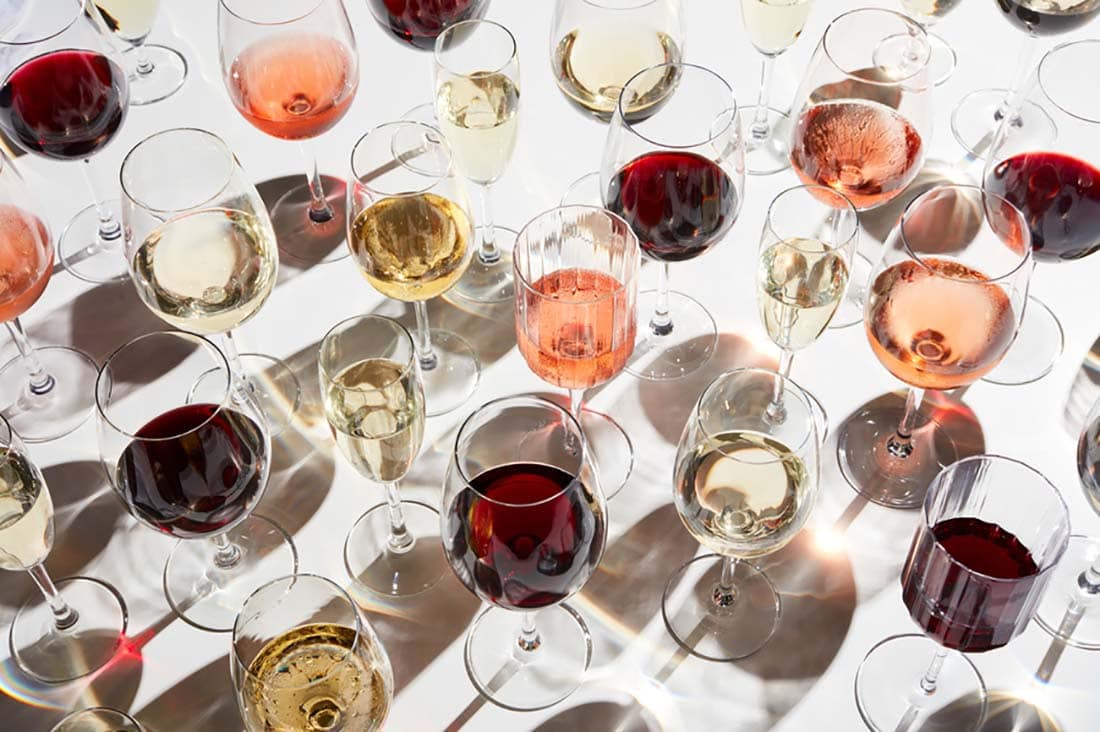Pour yourself a glass, and let’s talk about red wine. This crimson nectar, celebrated in cultures worldwide for its distinct flavors and ceremonial significance, has also been making waves in weight loss and wellness.
You’ve probably heard it before: Red wine, in moderation, can be beneficial for your health.
But did you know it could also be a surprising ally in your weight loss journey?
You read that correctly: red wine and weight loss can go hand-in-hand when done right. So much so that there is even a new buzzy trend in town called “wine dieting.”
But what is “right,” you ask?
Many questions add up to the answer. Like which red wine boosts metabolism? What is the best time to drink wine for weight loss? Is red wine better than white wine for health benefits? How many glasses make up the ideal wine dieting regimen?
And what about the converse scenario: Wine and weight gain? How many calories are there in a glass of wine? Does red wine make you gain weight? How does wine compare with other tipples like beer and vodka for weight management?
And finally, does red wine have other health benefits besides weight management? What about white wine? Or Champagne? Where do they stand on the wine dieting totem pole?
Let’s deep dive into the world of wine and wellness and explore this fascinating — and seemingly contradictory — connection.
The French Paradox: A delicious contradiction
It all started with the “French Paradox“: How the French consume a high-fat diet, smoke, and shy away from exercise, yet they have half the rate of heart disease (143 vs. 315 per 100,000 middle-aged men) and live 2.5 years longer than anyone else in the world.
French researcher Dr. Serge Renaud’s studies concluded this was because they drank bucket-fulls of red wine — 16 gallons per person per year vs. 2 gallons per person per year in America.
Thirty-two years later, practically every science lab worldwide has endorsed the theory and taken it further, crediting red wine’s health benefits with everything from weight loss and protection against cancer to lowering the risk of diabetes and helping manage depression.

Red wine and weight loss: A toast to scientific discoveries
Studies have repeatedly stressed that moderate wine consumption can aid in weight loss.
But how? The secret lies in a compound called resveratrol found abundantly in red wine. Resveratrol has been linked to various health benefits, and one of them, quite intriguingly, is weight loss.
Resveratrol enhances the conversion of ‘white fat’ (which stores calories) to ‘beige fat’ (which burns calories), effectively turbo-charging your weight loss journey.
Here’s a sample of studies linking red wine and weight loss:
1. The Harvard School of Public Health concluded a 13-year obesity study of 19,220 middle-aged women in 2010. The result? Women who drank two glasses of healthy red wine daily were 70% less likely to gain weight.
2. The University of Alberta, Canada, found that the weight-reducing benefits of red wine are similar to exercise (this one’s my favorite study!).
3. In 2015, researchers at the Washington State University found that resveratrol — an essential antioxidant in red wine — helps convert ‘white fat’ into ‘beige fat.’ Beige fat reduces weight gain by actively burning calories.
4. At Boston’s Brigham and Women’s Hospital, scientists concluded that red wine creates thermogenesis, which raises body temperature by burning more calories.
5. A Norwegian study revealed that one glass of red wine a day significantly increases appetite-regulating hormone leptin levels. And no, they were not even looking at buy trends like wine dieting bit cold, hard facts.
6. At Purdue University, it was discovered that healthy red wine contains piceatannol, which blocks fat cell growth. It also helps fight cancer, heart diseases, and neurodegenerative conditions.
7. According to the American Journal of Clinical Nutrition, red wine increases levels of good bacteria in the digestive tract.
8. According to a joint study between Harvard School of Public Health in the US, the Ben-Gurion University of the Negev in Israel, and Leipzig University, Germany, red wine increases the balance of HDL (the ‘good’ cholesterol) while boosting glucose metabolism to curb diabetes.
9. Wondering if virgin grape juice has the same benefits? A German study proved that wine drinkers lose more weight than grape juice drinkers.
Plus… other benefits of drinking red wine
And that’s not even all. Besides weight loss, other science-backed red wine health benefits include:
- Preventing gastric infections
- Reducing the risk of ovarian cancer
- Preventing heart disease
- Bypassing strokes and other cognitive disorders (think dementia and Alzheimer’s)
- Reducing the risk of depression
- Reducing the occurrence of type 2 diabetes (according to the American Diabetes Association drinking red wine can lower blood sugar for up to 24 hours)
- And — in the strangest of turnarounds — decreasing the prevalence of Non-Alcoholic Fatty Liver Disease (NAFLD)
But what about white wine and weight loss?
Does white wine enjoy the same health (and weight loss) benefits as red wine? Can white varietals be a part of wine dieting?
Short answer: No.
That’s because while both red and white wines come from grapes, red wine is made from the whole grape, including the skin and seeds.
The skin and seeds include potent antioxidants, particularly resveratrol, which give red wine the most weight loss and anti-aging benefits.
Red wine also has fewer natural sugars and more iron, potassium, magnesium, and bone-friendly phosphorous.

Uncorking the myth: Don’t the calories in red wine count?
Like everything else edible on Planet Earth, red wine comes with its own set of calories. On average, a 5-ounce glass of red wine carries around 125 calories.
But before you turn your back on our scarlet delight, consider this — an apple contains roughly the same amount of calories. But people don’t say, “An apple a day adds to weight gain!”
That’s because the calories in red wine (and apples) are negated by a low GI (Glycemic Index). GI measures how much glucose different foods produce in the bloodstream. Foods with a high GI score, like bread and cakes, produce large amounts of glucose, which is ultimately stored as fat.
However, some high-calorie foods such as nuts produce little glucose, explaining why they don’t make you gain weight.
Red wine scores very low on the Glycemic Index (less than 15), so it doesn’t pile on the pounds.
Which red wine is the best for weight loss?
If you are a die-hard wine lover with an eye on your waistline, you may wonder if there is such a thing as the “best red wine for weight loss.”
The answer is: Yes.
Not all red wines are created equal. The type of grape, the place it was grown, and the wine’s age can dramatically affect the levels of resveratrol (a weight-loss promoting compound) present in each blissful bottle.
To jog your memory, let’s revisit the golden rule we discussed earlier: the higher the resveratrol, the better the metabolism boost, and the more significant the weight loss effect.
But that’s not all! Here are a few other essential wine-shopping pointers to keep you on track with your wine dieting and weight-loss goals:
- Go low (on alcohol content): Wines with lower alcohol content are generally lower in calories too. Score!
- Be dry, not sweet: Dry red wines have less sugar than their sweet or dessert counterparts, making them a better choice for those watching their weight.
- Opt for organic: Organic or biodynamic wines tend to contain fewer additives and chemicals that might get in the way of your weight-loss journey.
So, looking for a healthy red wine that scores high on weight loss? Choose from this list.

Pinot Noir
Pinot Noir grapes are particularly rich in resveratrol due to their notably thicker skins than other wine grape varieties. A 4-ounce serving of Pinot Noir provides about 640 micrograms of resveratrol, more than most red wines.
Choose a bottle of California Pinot Noir, and you’ll find around 5.01 milligrams of resveratrol, illustrating how geography can influence the resveratrol content.
Beyond its impressive resveratrol concentration, Pinot Noir also stands out for its lower natural sugar content at the onset of fermentation.
This leads to a lower sugar level and calorie count in the finished wine — a glass of Pinot Noir only contains about 88 calories and 3 grams of carbohydrates. Hello, wine dieting!
Malbec
Get ready to venture high into the Andes with rich and robust Malbec grapes. Especially when cultivated at high altitudes in regions like Argentina and Chile, these grapes are nature’s overachievers, boasting extraordinarily thick skins, which makes them a powerhouse of resveratrol!
And here’s an exciting twist: when it comes to antioxidant content, Malbec isn’t just competing; it’s outperforming. With an antioxidant content four times that of popular Merlots and nearly double that of Cabernet Sauvignons, Malbec is the underdog turning heads in the world of wine.
Fun fact: April 17 is World Malbec Day. It’s the perfect excuse — as if you needed one — to celebrate and savor this flavorful and uniquely healthy wine!
Barbera
Originating from Italy and now popular in California, Barbera wines are making a splash in the world of reds, thanks to their impressive resveratrol content.
Cold ripening and fermentation methods, such as those practiced in Northern Italy, enhance the resveratrol concentration in Barbera grapes.
And there’s more! Barbera grapes cultivated in high-altitude regions tend to produce higher concentrations of resveratrol than those grown at lower elevations. Isn’t it fascinating how climate and topography can significantly affect wine’s health properties?
Grenache (or Cannonau)
The Grenache grape is a resveratrol powerhouse, particularly the variety grown in Sardinia, Spain. Locally known as Cannonau, it contains 2-3 times this health-boosting compound compared to other red wines, even outshining its Grenache cousins from Southern France.
In fact, the consumption of a daily glass of Cannonau is linked to Sardinia being identified as one of the world’s five “Blue Zones.” These magical spots on the globe are home to individuals who live longer and enjoy better health and relationships.

Madiran
Madiran wines, originating from the Gascony region in southwest France, have incredibly high levels of resveratrol. The health benefits of this wine are attributed to the mighty Tannat grape, which, by law, must constitute 60-80% of any wine with the Madiran appellation.
Roger Corder, the author of The Red Wine Diet, even suggested that Madiran could be the healthiest wine globally.
The evidence is compelling: Despite indulging in a diet high in fat, the men of Madiran live to a ripe old age, with the area boasting twice the national average of centenarians.
Merlot
Merlot, a red wine variety abundant in resveratrol, is another good choice for those targeting weight loss. And just like its cousin Pinot Noir, Merlot is a lean choice, packing around 88 guilt-free calories per glass and similar carb content.
Pro-tip: Veer towards the dry side when hunting for the perfect Merlot. Why? Because dry wines generally contain less sugar and fewer calories than their sweeter counterparts.
How much red wine should I be drinking?
Time calls alcohol the “Goldilocks of the nutrition world.” Drinking too little may deprive you of red wine’s health benefits while drinking too much can also be destructive to your health.
Before you dive headfirst into a wine barrel, remember that moderation is key.
Even if we look to the French and the Italians for their propensity to drink more wine and yet be healthier than any of us, you will never catch them binge drinking — even on weekends. Instead, they drink a little every day and know when to stop!
So, what are the recommended quantities of red wine for weight loss? This is typically defined as one drink per day for women and two for men. One drink equals 5 oz (150 ml) of wine at 12% alcohol by volume.
Why do women have a lower limit?
It’s nothing to do with sexism: Females generally have lower levels of alcohol dehydrogenase, a liver enzyme that metabolizes alcohol. Hence, they are advised to drink smaller amounts of alcoholic beverages.
And when to drink red wine for maximum benefits?
Red wine, like every other alcohol, doesn’t play well with empty stomachs.
The beauty of enjoying red wine (and a major component of wine dieting) lies in savoring it slowly, the Mediterranean way: Combined with a meal rich in fruits, vegetables, whole grains, and olive oil. Following this lifestyle can help you keep those extra pounds at bay, all while savoring a delightful glass of red.

What if I can’t have red wine?
Firstly, don’t drink red wine suddenly if you’re a teetotaller. Or without checking with your doctor if you have health problems. Or if you or your family has a history of health abuse. Or if you react badly to the beverage in any form!
Instead, stock up on other antioxidant and resveratrol-rich foods, like blueberries, strawberries, raspberries, red grapes, peanut butter, dark chocolate, and apples.
Raise your glass to healthier choices
Who knew that losing weight could be such a delectable affair? With science backing its benefits and a world of flavors to explore, a glass of red wine could be a fun part of your weight loss journey.
Remember, the mantra is simple: moderation and balance. Don’t let the scales tip too much on either side. Treat red wine as a supplementary part of your wellness journey, not a magic elixir that will melt away pounds overnight.
Combine it with a balanced diet and regular exercise, and you have a recipe for sustainable weight loss.
So, why not raise a glass to healthier choices? Here’s to savoring life, one sip at a time!

FAQs
Here are the most frequently asked questions about red wine and weight loss.
Which red wine boosts metabolism?
Red wine’s metabolism boosting benefits stem from resveratrol, an antioxidant found in the skin of red grapes, peanuts, and berries. Pinot Noir typically has the most resveratrol, then Malbec, Barbera, Grenache, Madiran, and Merlot.
When should I drink red wine to lose weight?
A study published in The Drinks Business journal by Washington State University suggests drinking approximately two glasses of red wine before bed can contribute to healthy weight management. Ideally, pair it with a meal that’s rich in fresh vegetables, fruits, lean proteins, and healthy fats like olive oil. This can help your body metabolize the alcohol more efficiently.
What is wine dieting?
Wine dieting is a lifestyle approach that integrates moderate red wine consumption into a balanced diet. It hinges on the idea that red wine contains health-beneficial antioxidants like resveratrol and flavonoids. The practice encourages mindful selection and enjoyment of wine, portion control, and pairing wine with nutritious foods. It also encourages mindful drinking, treating each sip as a sensory experience.
What is the wine and egg diet?
The wine and egg diet is a rather unconventional diet plan that Vogue printed in 1977. This form of wine dieting typically lasts for a week. It involves consuming lean proteins from eggs, complemented by moderate amounts of red wine and black coffee. The idea is to combine the proteins from the eggs, the wine’s antioxidants, and the coffee’s metabolism-boosting properties to lose weight.
How much wine is OK for weight loss?
The magic number of wine glasses that could aid weight loss depends on age, gender, weight, and overall health. However, the general recommendation is up to one serving per day for women and up to two for men. And put away those grand goblets as the USDA defines a serving of wine as five ounces. Remember, like all good things, red wine is at its best in moderation!
Does red wine have fewer calories than other alcoholic beverages?
Generally, a 5-ounce serving of red wine contains around 120 calories, similar to the calorie content of a 12-ounce serving of beer. However, this can change based on aspects like alcohol content and ingredients. For instance, a 12-ounce serving of a high-alcohol beer can contain over 200 calories. Similarly, mixed drinks that contain sugary mixers can have significantly more calories than a serving of red wine.
How does red wine consumption fit into a healthy weight loss plan?
Red wine consumption can fit into a healthy weight loss plan when consumed in moderation as part of a balanced diet and exercise routine. While drinking red wine alone is not a guaranteed way to lose weight, it may aid in weight loss due to the presence of resveratrol, which has been linked to a boosted metabolism.
What are some tips for incorporating wine into a weight loss diet?
Here are some tips for incorporating wine into a weight loss diet:
1. Drink in moderation: Per USDA guidelines, keep wine intake to one serving daily for women and two for men.
2. Choose red over white: Red wine supports weight management better than white wine as it contains resveratrol, a metabolism-boosting compound.
3. Consider this in your calorie count: A 5-ounce serving of wine has approximately 120 calories.
4. Pair wine with healthy foods: Consuming wine with vegetables, fruits, and lean proteins aids efficient alcohol metabolism.



meenal deshpande says
Thanks for sharing.
good article to read.
Judith Ikuenik says
I truly loved the article on benefits of red wine particularly the French wine.
I love drinking wine but didn’t know which wines were benefiting and healthy for weight loss purposes until I read your article.
Thanks for the insight, I’ll do so & find out for myself the benefits.
Cheers,
Judith(Papua New Guinea)
Hayley says
Red wine has many benefits such as its help to control heart diseases and heart attack and heart strokes. The wine is also best for losing weight. The taste of wine has great importance. Thanks for the insight, I’ll do so & find out for myself the benefits.
Kaye Johnson says
I have been struggling with weight loss almost all my life. I have been introduced to a diet, and it pretty much has done something to my weight. I feel a bit lighter now too, but the love for red wine has not seem to leave. Anyway, I just learned that red wine is not bad, as long as taken in moderation, for my current diet as well so I’m just happy.
fitoru.com says
Important points in this article that we should be aware of. This would be a huge help. Thanks for sharing this great article.
Susan Swain says
Very convincing article. But I am wondering where your works cited “page” (listing) is. While you referenced studies, I did not find anything that would allow me to find your resources to substantiate the claims made. Since it seems to fly in the face of more conventional medicine, I would like to have seen that. It has given me something to think about, but as yet I can not corroborate the claims with the information I receive from mainstream medicine. I would love to have a full works cited if you have it!
Maggiemay says
Just Google it
Madeline Theis says
Red wine can be good for weight loss, but there should be a limit to everything you consume. Can one replace other alcohol like beer with Red wine if the person is concerned about weight loss?
Guri Makeup says
This article contains important information that we should be aware of. This would be quite beneficial. Thank you for sharing this fantastic article.